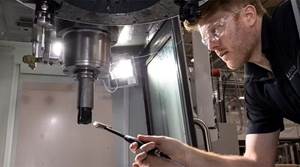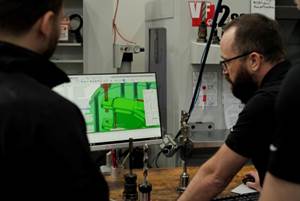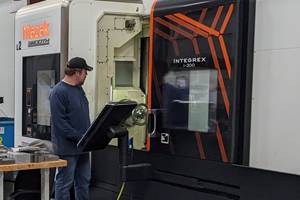Taking The Broad View On CAD/CAM Functionality
It is a complete CADD through CAM system that includes the SolidWorks solid modeler, multiple-surface milling, tool path simulation and verification, photorealistic rendering and animation
Share





CAD/CAM technology has come a long way over the last decade. Affordable PC-based solid modelers, for instance, have grown very easy to use and now can handle surprisingly complex parts. Moreover, some CAM systems today are a snap to master with so much built-in machining process knowledge that very sound tool paths can be created with a small fraction of the clicks and keystrokes required only a few years ago. And these programs can be fully "tried out" in the virtual environment of an NC verification program.
What users can't necessarily get at a moderate price, however, is all these capabilities bundled into a single, integrated system. That's precisely what Manufacturing and Consulting Services, Inc. (Scottsdale, AZ) is after with the introduction of their new Anvil Express product line. It is, says the developer, a complete CADD through CAM system that includes the SolidWorks solid modeler, multiple-surface milling, tool path simulation and verification, photorealistic rendering and animation.
But rather than just bundling a lot of modules into a single wrapper, the developer has given a great deal of thought to how to make all this functionality work together, and how to make it easy to master. For instance, one of the most interesting features is how the system instructs first-time or occasional users on various aspects of the system's functionality. That includes a structured set of online, multimedia tutorials with separate exercises for novice, intermediate and experienced users. Because the tutorials include audio explanations, the user can listen to the instructions while paying complete attention to the interface, rather than having to constantly look back and forth from some form of instruction text to the screen.
The CAD functionality includes a number of tools for the creation of geometry. Besides solids, users can work with surfaces and wireframes. Models can be created parametrically so that workpiece features can be defined in terms of their relationship to other elements rather than specific dimensions. This way a through-hole, for instance, continues to be a through-hole regardless of the material thickness, even after modifications to the geometry.
The modeler also includes a new feature: "Autosnap 3-D." With this capability, once 2D geometry is created in two perpendicular planes, the system can automatically create a solid model from that data.
The combination of the solid modeler with a substantial amount of stored manufacturing knowledge allows the system to efficiently generate tool paths and deliver a surprising degree of NC programming automation. For example, once a tool is chosen for a given machining operation, the system automatically generates formula-based feeds and speeds as well as tool entries and retracts, based on the workpiece material and user-specified preferred practice. Moreover, modal files allow the user to store standardized manufacturing processes which quickly can be parametrically applied to the specific geometry of any appropriate workpiece or workpiece feature.
The initial release of the system runs on Pentium-based PCs running Windows NT 4.0, and the company is looking into porting it to Digital Alpha/NT workstations as well as Windows 95 and 97 platforms in the future.
According to the developer, the target market for the new CAD/CAM system includes "companies that use the disciplines of mechanical engineering to design and manufacture discrete parts and assemblies. The price of Anvil Express and its ease of use makes it suitable for small shops as well as major multinational corporations." If they are right about that, this well could be the model for a new generation of CAD/CAM systems that deliver an unprecedented combination of low cost and high functionality.
Related Content
How to Mitigate Chatter to Boost Machining Rates
There are usually better solutions to chatter than just reducing the feed rate. Through vibration analysis, the chatter problem can be solved, enabling much higher metal removal rates, better quality and longer tool life.
Read MoreAutomated CAM Programming – Is Your Software Really Delivering?
A look at the latest automation tools in Autodesk Fusion 360 software and how forward-thinking machine shops and manufacturing departments are using them to slash delivery times and win more business.
Read More5 Tips for Running a Profitable Aerospace Shop
Aerospace machining is a demanding and competitive sector of manufacturing, but this shop demonstrates five ways to find aerospace success.
Read MoreCutting Part Programming Times Through AI
CAM Assist cuts repetition from part programming — early users say it cuts tribal knowledge and could be a useful tool for training new programmers.
Read MoreRead Next
5 Rules of Thumb for Buying CNC Machine Tools
Use these tips to carefully plan your machine tool purchases and to avoid regretting your decision later.
Read MoreRegistration Now Open for the Precision Machining Technology Show (PMTS) 2025
The precision machining industry’s premier event returns to Cleveland, OH, April 1-3.
Read MoreSetting Up the Building Blocks for a Digital Factory
Woodward Inc. spent over a year developing an API to connect machines to its digital factory. Caron Engineering’s MiConnect has cut most of this process while also granting the shop greater access to machine information.
Read More





























